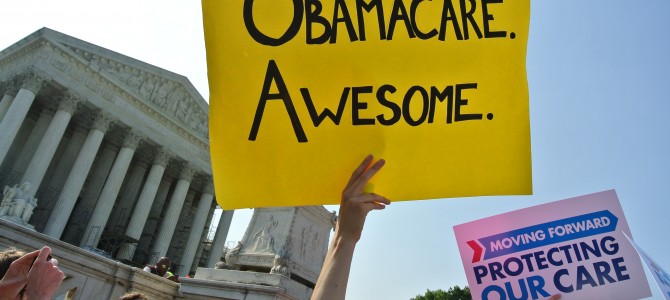As summer slides into autumn, the Affordable Care Act doesn’t seem to be weighing as heavily on our elected leaders as it was this time last year, before the botched rollout of the health insurance exchanges and the battles over Medicaid expansion in state legislatures. Even Congressional Republicans appear to be losing interest. Lawmakers in Washington last summer churned out nearly four times as many press releases that referenced Obamacare than they did this summer, and GOP candidates on the campaign trail have begun shying away from direct calls for repeal. As Aaron Blake noted last week in The Washington Post, “as electoral wedge issues go, it’s certainly lost its luster.”
But whether or not we’re done with Obamacare, it’s certainly not done with us. The jobs report last week from the Bureau of Labor Statistics brought news that the economy added just 142,000 jobs in August, far short of the 230,000 forecast, while numbers for June and July were revised downward by 28,000 combined.
The report adds to mounting evidence that slow economic growth under the Obama administration isn’t just a hangover from the Great Recession but is a consequence of the ACA. Critics of the health care law have long warned that it would create perverse incentives for employers to shed full-time workers and for the unemployed to remain that way, as the University of Chicago’s Casey Mulligan has shown.
Although it’s difficult to prove definitively that Obamacare is slowing growth and discouraging new hires, the BLS jobs report compliments what employers themselves have been saying with growing frequency. Federal Reserve Bank surveys last month in New York, Philadelphia, and Dallas asked employers about the effects of the ACA on hiring and employee healthcare costs, and the results show that a vast majority of firms are facing higher health care costs and a significant number are responding by passing along premium hikes to employees, getting rid of full-time workers, or hiring more part-time workers and contractors.
In New York, two separate polls found 80 percent of manufacturers and 74 percent of services firms expect health coverage costs to increase next year, and a lesser but still significant share said they reduced their number of employees because of the ACA (21 percent of manufacturers and 17 percent of service firms). A full 20 percent of respondents in both surveys reported they were cutting full-time workers or increasing the use of part-time workers as a direct response to the health care law.
Same thing in Philadelphia, where more than 15 percent of surveyed firms said their number of full-time workers was lower, more than 16 percent said the number of part-time workers was higher, and more than 28 percent said they were charging customers more—all in response to the ACA.
In Dallas, about 84 percent of manufacturing firms said the ACA increased healthcare costs this year and expect it will do the same next year, while about 90 percent of service firms are bracing for higher costs in 2015. More than a quarter of manufacturers said they now employ fewer workers, more than 16 percent said they hired more part-time workers, more than 17 percent said they outsource more work, and 20 percent said they’re paying employees less. Among service firms, more than 40 percent said the number of workers that are part-time, temporary, contract, or outsourced to other firms has increased.
Of course, these are just surveys, which makes it easy for the Left to dismiss the results as evidence of nothing so much as a handful of greedy bosses using Obamacare as an excuse to lay people off or swap them out for cheaper contract or part-time workers. Something similar, albeit more measured, happened when the BLS report came out last week, with caveats that you have to look at the three-month average, wages are up slightly and long-term unemployment continues to decline, nothing much to see here, “probably just a blip,” everyone move along.
But the report is likely reflecting deeper problems in the economy caused, at least in part, by the ACA. Perhaps more important that the number of jobs, after all, is the labor force participation rate—the number of those either working or looking for work as share of the total population—which at its lowest since the 1970s. A CBO report issued late last month projected the labor force participation rate will not return to pre-recession levels over the next decade, and cited Obamacare as the reason: “with the largest effect stemming from the subsidies that reduce the cost of purchasing health insurance through the exchanges.”
In other words, millions of Americans have either given up hope of finding a job or are looking at the family budget and rightly concluding that taking a full-time job will mean losing their health insurance subsidy, and that it’s just not worth it. The aforementioned Mr. Mulligan has said that, “if you pay unemployed people you’re going to get more unemployed people,” which precisely describes the effects of Obamacare’s subsidy scheme for health coverage.
When the CBO first reported these effects on workforce participation back in the spring, House minority leader Nancy Pelosi tried to turn it into a talking point, saying that one of the aims of the law was “to give people life, a healthy life, liberty to pursue their happiness. And that liberty is to not be job-locked, but to follow their passion.” The White House used the same glib language of empowerment and pursuing one’s passions to describe Obamacare’s perverse incentives.
But out in America, where millions of people have simply dropped out of the workforce, the job-lock rhetoric rings hollow. The reports and surveys and data are adding up, gradually revealing the deleterious effects of Obamacare even as the political class has begun to lose interest. Our leaders in Washington might not fully realize how the ACA is burdening the economy, but American business owners and their employees most certainly do.








